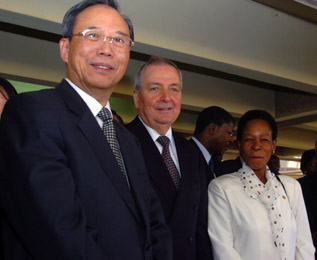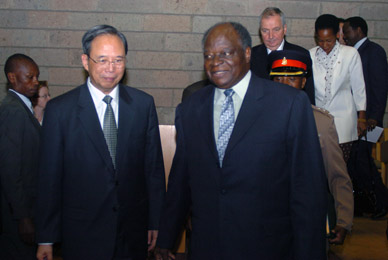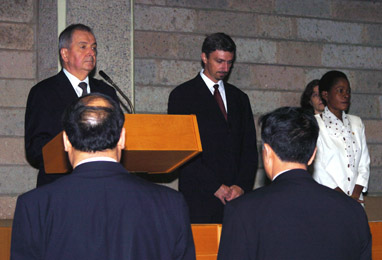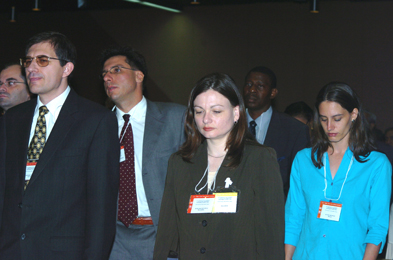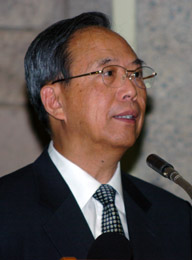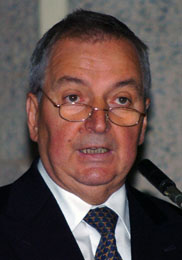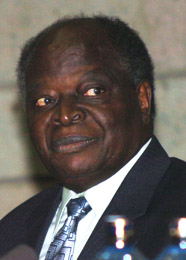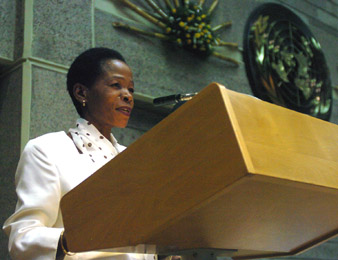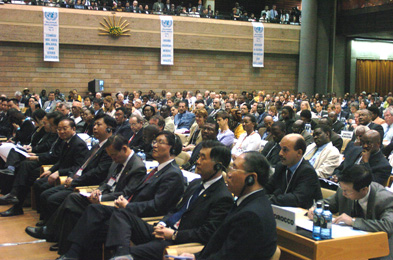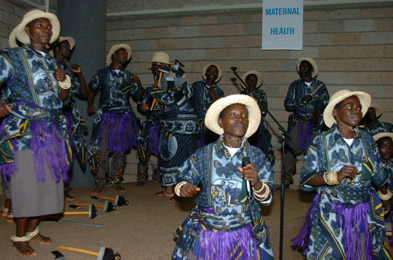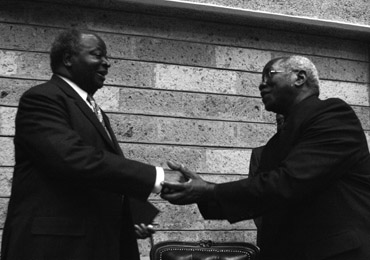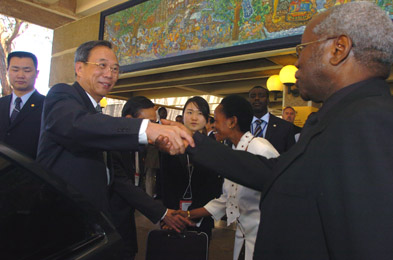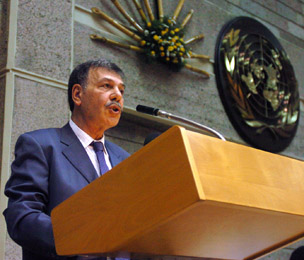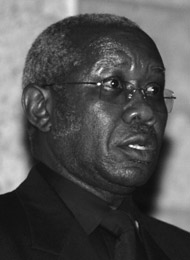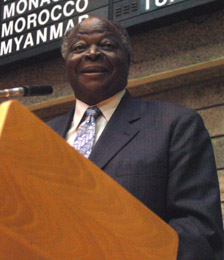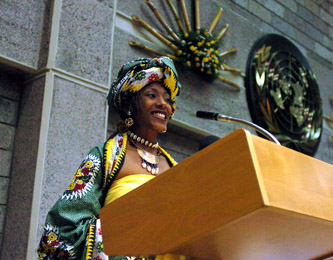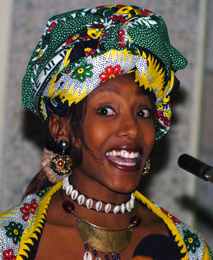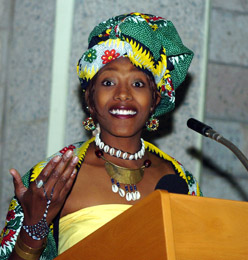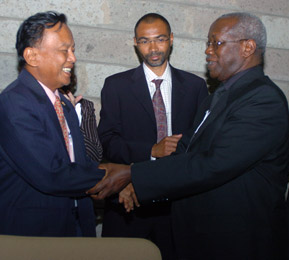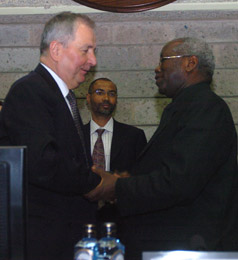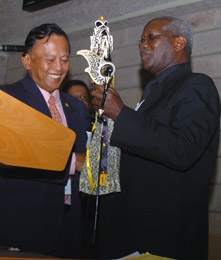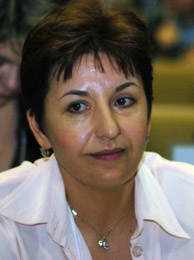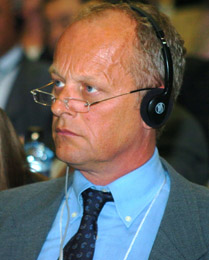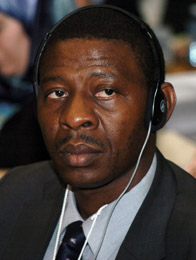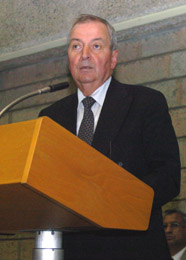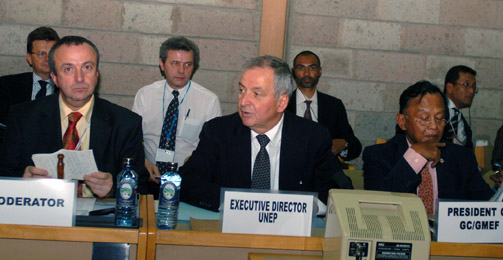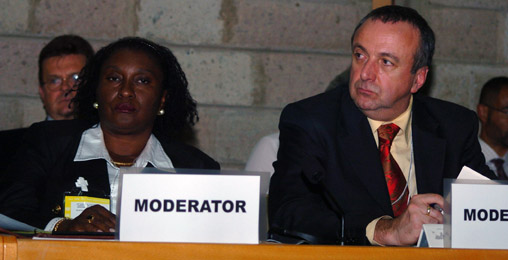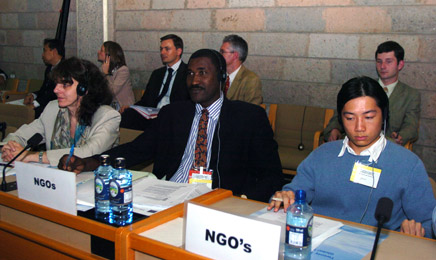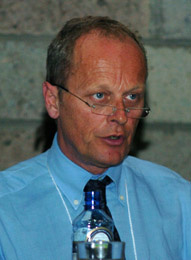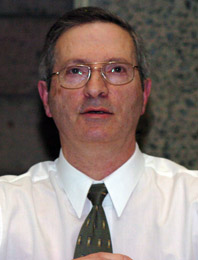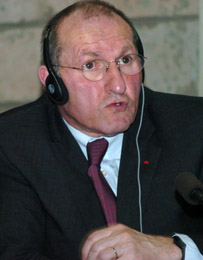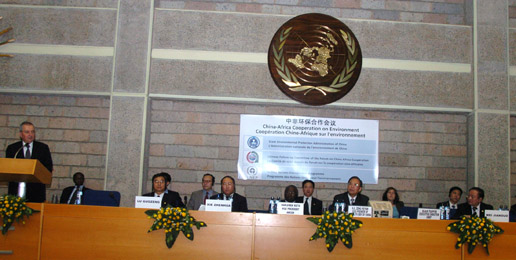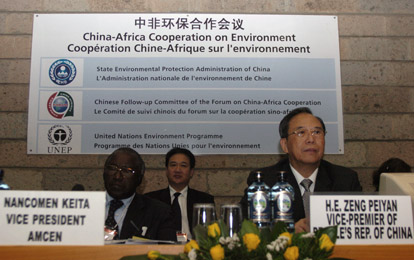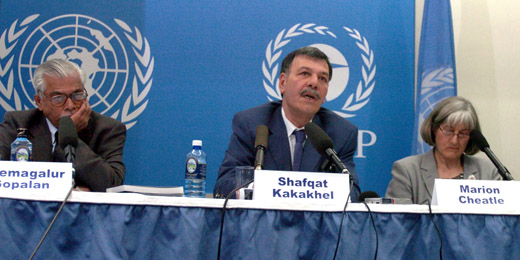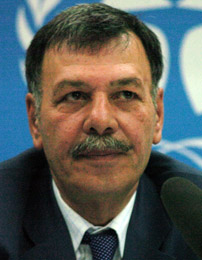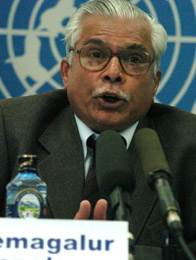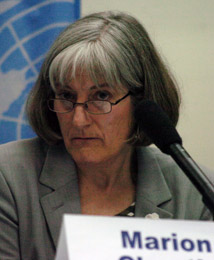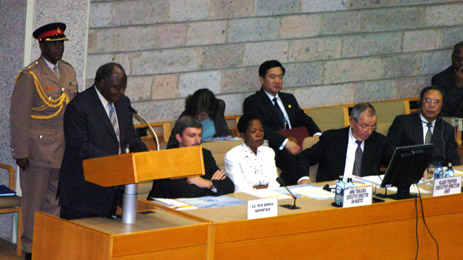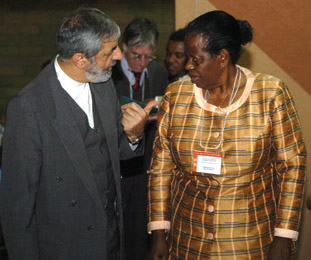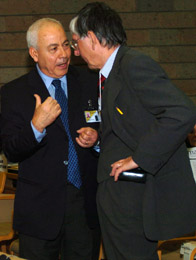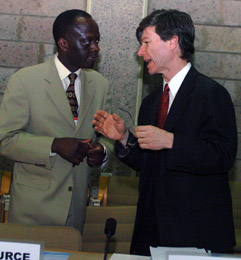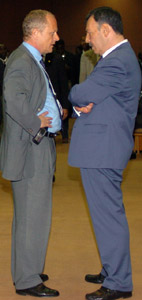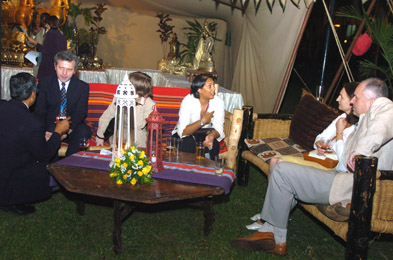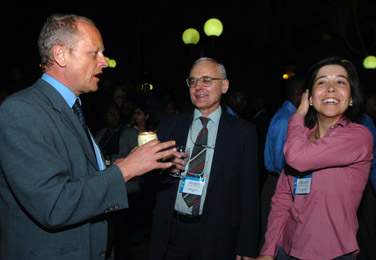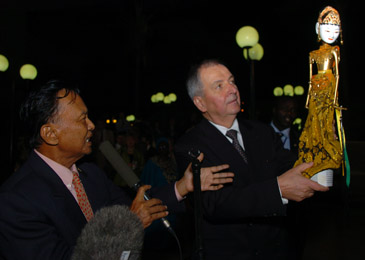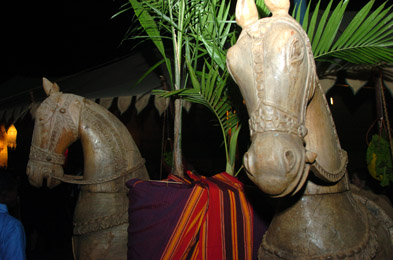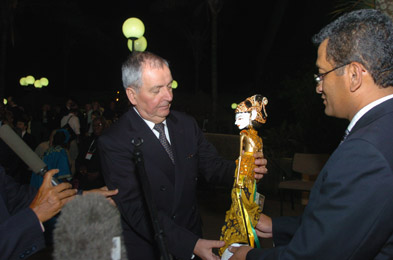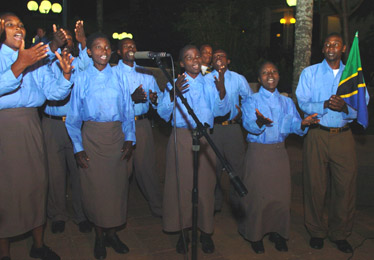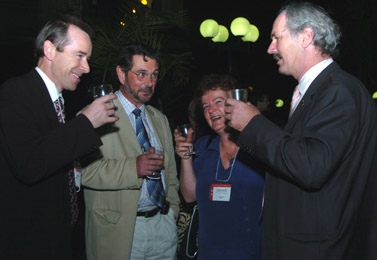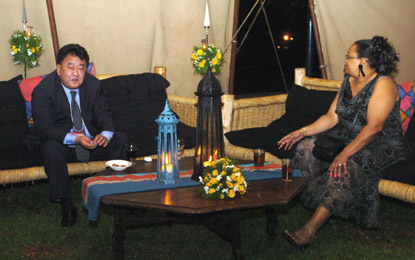Zeng Peiyan, Vice-Premier of China (left) , outlined China 's commitment to environmental protection, emphasizing that the ultimate goal of sustainable development is to ensure human benefits. He called for international cooperation in new areas for implementing the MDGs, such as building environmental infrastructure, reducing natural disasters, opening markets and removing trade barriers; Klaus Töpfer, UNEP Executive Director (center); and Mwai Kibaki, President of Kenya (right) , emphasized the opportunity to utilize UNEP's work programme to eradicate extreme poverty and ensure sustainability. Noting the enormous challenges facing developing countries in meeting the MDGs, he called for international cooperation in reaching them.
|
|
| Anna Tibaijuka, Executive Director of UN-HABITAT (left), stressed the need for cooperation among various international organizations and a concrete policy commitment by governments in meeting the poverty and environment challenges, especially the provision of safe drinking water and housing to people living in slums. |
|
|
|
|
|
|
|
| Shafqat Kakakhel, UNEP Deputy Executive Director (left), delivered a message from Kofi Annan, UN Secretary-General; outgoing Governing Council President Arcado Ntagazwa (Tanzania) (center) said the adoption of the Bali Strategic Plan was a crucial achievement that will change the way UNEP conducts its business and said the Plans' success will depend on how it is financed; and Kenyan President Mwai Kibaki (right) |
| Caroline Wanjiru Mderitu of Kenya read a poem to the GC called "Know Environment Now" |
|
| |
| Rachmat Witoelar , Indonesia 's Minister of Environment, was elected as GC President by acclamation (left) and presented a gift to outgoing GC President Arcado Ntagazwa (right) |
| |
|
| |
|
| GC Vice-Presidents Sulfina Barbu (Romania), Beat Nobs (Switzerland), and Laurent Sedogo (Burkina Faso) |
|
| Policy Statement of the Executive Director |
| |
In his policy statement, UNEP Executive Director Klaus Töpfer stressed the importance of GC-23/GMEF's contributing to the work of the Beijing +10 review, the Commission for Sustainable Development, and the upcoming General Assembly Summit. He recommended a “Nairobi Communiqué” as an outcome of the GC/GMEF Ministerial Dialogues, which he said should focus on the rule of law and its role in meeting the MDGs. He also urged a focus on: the ecosystem approach to Integrated Water Resource Management; technology transfer; capacity building; sustainable consumption and production; chemicals, including mercury; the Bali Strategic Plan; strengthening UNEP's science base; and early warning-systems. |
|
|
| Ministerial Consultations |
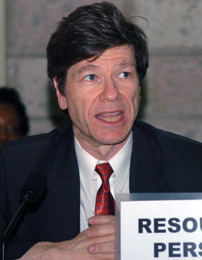 |
|
| |
| The Ministerial Consultations were moderated by Elizabeth Thompson, Barbados ' Minister of Physical Development and the Environment and Miklós Persányi , Hungary 's Minister of Environment (right). In a key-note address, Jeffrey Sachs, UN Millennium Project (left), underscored the links between poverty and environment, and outlined the recommendations of the Millennium Project report. He highlighted the need for rich countries to fulfill their commitments to provide 0.7% of GDP for development assistance to meet the 2015 goals. Noting the lack of an environment focus in the majority of Poverty Reduction Strategy Papers, he underscored the need for a local UNEP presence and increased local environmental expertise in poor countries. |
| |
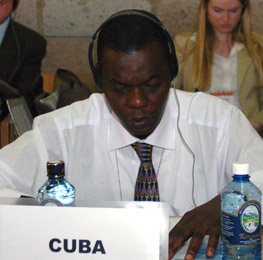 |
|
| |
Cuba , for the G-77/China (left), expressed concern over decreasing ODA and increasing conditionalities for the provision of financial resources, and stressed the importance of increased market access and a durable solution to the debt problems of developing countries. He emphasized the need for the effective and immediate implementation of the Bali Strategic Plan, including the provision of necessary financial resources, as well as strengthening UNEP's financial base and scientific expertise. He said the Group supports the adoption of a decision on the strengthening of environmental emergency responses and the development of early warning systems, and urged completing the Strategic Approach to International Chemicals Management (SAICM) process before addressing new substantive issues and negotiations in the chemicals field. Representatives from Business and Industry, Environmental NGOs and Youth during the Ministerial Consultations (right) |
|
GC Vice-President and COW Chair Beat Nobs
John Buccini, UNEP, presented on chemicals management (UNEP/GC.23/3/Add.1), and the chemicals-related draft decisions prepared by the CPR (UNEP/GC.23/L.1). Noting the progress achieved in the SAICM process, UNEP's mercury programme, and the Rotterdam and Stockholm conventions, he said a single decision on chemicals management, instead of various decisions on different items, is being considered. On mercury, he said the current proposed decision reflects alternative paths to move forward, and he predicted substantial discussions on this item in the chemicals contact group. Guy Canivet, President of France's Court of Appeals, presented the outcome of the roundtable dialogue on advancing the MDGs through the rule of law, held in Nairobi on 16-17 February 2005 |
| Special Event: China-Africa Conference on Environmental Cooperation |
A special event on China-Africa cooperation on environment was held with Zeng Peiyan, Vice Premier of the State Council, China, welcoming remarks from Klaus Töpfer, Executive Director, UNEP, and statements from, inter alia, Xie Zhenhua, Minister, State Environmental Protection Administration, China, and the President of the African Ministerial Conference on Environment, Oman Mohammed Sudani,as read by Nancoman Keita, Vice-President of the African Ministerial Conference on the Environment, Minister for Environment of Mali. |
| Press Conference: Launch of the GEO Yearbook |
| Shafqat Kakakhel, UNEP Deputy Executive Director, Hiremagalur Gopalan, UNEP, and Marion Cheatle, UNEP |
|
|


